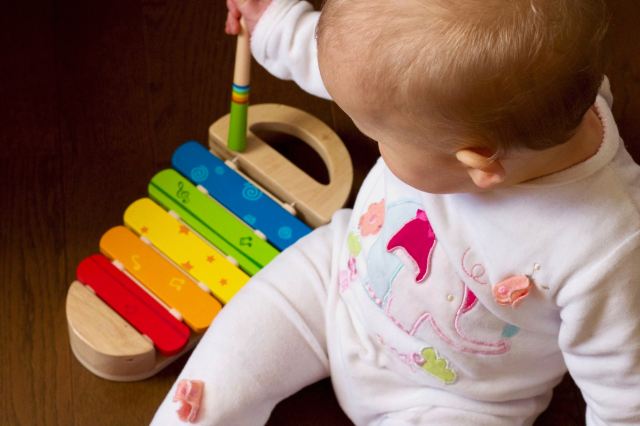The good thing about helping your baby learn is that they’re pretty much learning all the time in this stage of life. New experiences are happening every day, and every unique experience supports learning. To foster your baby’s skills, here are nine simple things you can do (if you aren’t already!) to support your baby in their learning process.
1. Introduce New Foods: Once your baby is a few months old, it’s time to start introducing solid foods. From the beginning, vary the types of foods you give your baby—it’s good for their health and will help them learn about different textures and tastes.
Some tips for successfully introducing new food include checking for cues that your baby is ready—such as reaching for your food. And don’t worry if they reject a new food—it’s all part of the process.
2. Talk Often: Talking to your baby helps them in many ways. By listening to your voice, they’ll slowly begin to understand words and respond in their own way, eventually leading to them speak and communicate in the same way you do. There are lots of ideas to help you talk to your baby. Talk to them about everything—even reading a book or singing a song will help their brain develop.
Remember to include them in the conversation, even if you’re unsure of what they’re communicating, by listening and responding to their sounds. It may seem silly, but infant-directed talk (more commonly known as baby talk) has been found to help children’s language development.
3. Use Hand Motions: Using your hands to describe concepts helps your baby start to understand what those words mean. Songs like “itsy-bitsy spider” and “pat-a-cake” are fun not only because they make rhyming sounds, but they also provide physical explanations about language.
Beyond such games, gesturing when you want your baby to do something, or when you’re explaining something, is also a great way to help babies learn to communicate. And remember that babies can use gesturing before they can use words, so making good use of physical language will also help you understand your baby better.
4. Be Silly: Play is one of the main ways babies and children learn. Though you might feel, well, silly, it’s important for you to be a goofball for your baby. Doing so provides entertainment and also a strong emotional connection. And you already know the delight of hearing your baby laugh in joy.
Start with something simple like peek-a-boo. Dance around to some music with them. These things aren’t only fun, but help your baby develop important motor skills and understanding of how their bodies move through space.
5. Demonstrate: When you’re trying to teach your baby to do something, do it yourself. Babies and young children are often drawn to imitate the adults in their lives, so take full advantage of this tendency.
Do what you want them to learn. When they’re learning to eat, showing them how you use a spoon before encouraging them to do it themselves helps them understand. And a few months after that, they might start imitating your every move—whether you want them to or not.
6. Explore the World: Adults aren’t the only ones for whom the outdoors holds health benefits. The sun, wind, grass, trees, and insect life will all be fascinating to your baby, who’s experiencing new things all the time. New experiences hold great learning potential for babies, as long as you’re there with them to provide a sense of security and comfort.
Studies have found that being outside helps babies and young children develop language skills, improve motor skills, and even develop stronger immune systems. And don’t forget the time outside is good for you too.
7. Provide Sensory Toys: Babies will turn just about anything they reach into a toy, but for your own sanity as well as their learning process, you can make plenty of sense-stimulating toys available. Toys with interesting and varied textures and colors are great for babies of any age. Instruments for babies are also good—just remember you’ll be listening to them, too!
While less common, you can also find toys that offer specific smells or tastes, or make things yourself. For instance, a bowl of spaghetti and some food coloring can be endlessly fascinating to your baby. Or make a homemade scent bottle with fresh, whole spices and a plastic bottle with a pop-top lid.
8. Start Counting: Even when your baby is pre-verbal, they’re starting to build upon concepts that will be used later. Count the steps you take together to the car, the number of times you clap, or their fingers. Count their blocks, and when they’re a little more advanced, divide the blocks by type and count each group. This behavior will be beneficial when they’re old enough to start learning basic mathematical concepts.
9. Touch Often: While it might seem less directly connected to cognitive development, touch actually supports the development of physical, language, and cognitive skills. Of course, you spend plenty of time holding your baby, but branch out from that into other forms of touch. Try stroking or gently massaging your baby’s back and legs when they’re upset. To help them wake up from a nap, touch their face and stomach. If you’re able, also consider using body carriers or wraps to take your baby out and about with you rather than a stroller.
Before you get caught up in trying to find the best learning toys out there, remember that straightforward behaviors from you and the creative use of simple objects can go a long way in helping your baby learn. The best way to support your baby’s development is to make these things part of everyday life.











